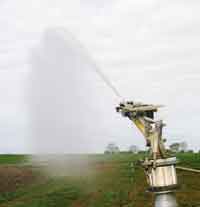Water shortages could change structure of farming – RASE

Shortages of water in some parts of the country may lead to structural changes in the make up of the farming industry, according to scientists.
The Royal Agricultural Society of England has published a report, Water for Agriculture – Implications for Future Policy and Practice, which looks at what difference climate change could have on water availability for agriculture.
The document, written by scientists from the University of Reading, urges farmers to start adapting their businesses for reduced amounts of water in the coming decades because of higher temperatures and lower rainfall. It also says there is a clear risk of more frequent extremes of drought and flooding.
To give farmers a clearer idea of what this might mean for their business, the report includes case studies that look at the practical steps producers might need to take.
For example, it says that an upland livestock farm in Cumbria might need to look at housing animals earlier because of wetter autumns and long-term lambing may need to move indoors.
It suggests that while there may be a longer growing season for forage crops, yield and dry matter may fall away after the early part of the season, which means farms might need more forage conserved as a summer buffer and for winter feeding.
Arable farms in the east of England are being warned that climate extremes may mean cultivations are delayed or disrupted. If temperatures rise and there is a dry summer, then there could be problems with crop establishment because of a lack of moisture.
Alternatively, higher rainfall could mean wetter autumns which could leave farmers with difficulties getting on to land.
The paper says that this will influence labour use at peak times and could lead to changes in machinery policy. It may also make spring sowing more attractive.
“Farmers and growers must believe that climate change is a reality and that constant, manageable water supply is likely to be an early and major victim of those changes,” said Ian Bell, RASE agri-science director.
But he added: “This is a challenge for plant breeders, policy makers and planners as well as farmers.
“Plant breeders will need to incorporate drought resistance and waterlogging tolerance into new varieties; water policy will have to reflect the need to conserve and perhaps even redistribute water from wetter to drier areas and planners must be flexible in allowing farms to build reservoirs so they can conserve winter rainfall for summer irrigation.”
How might farming change?
• Vegetables and sugar beet may shift from drier east to the wetter west if irrigation cannot be secured.
• In lowland areas livestock may give way to arable production.
• Arable operations may become more compressed which will have implications for labour and machinery use.
